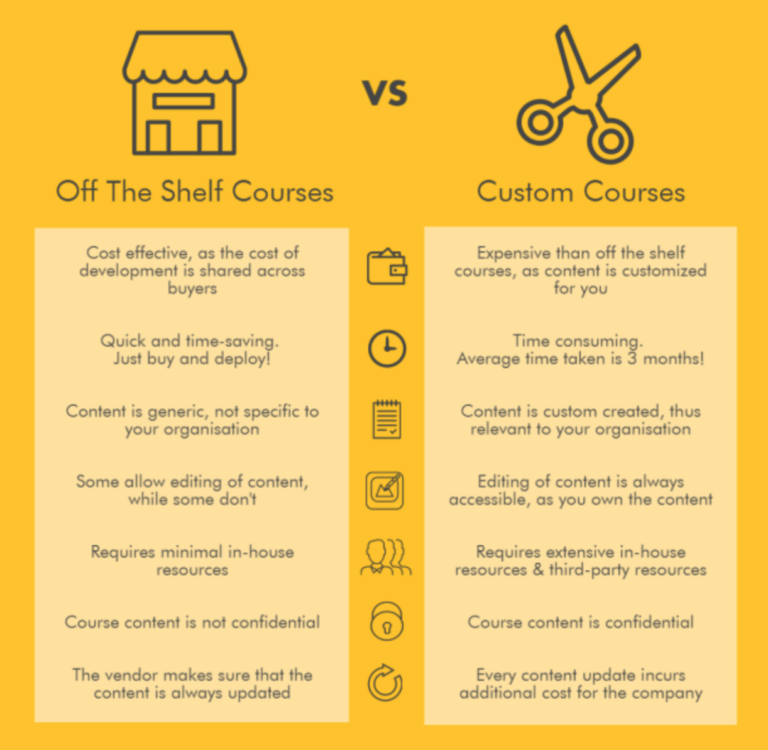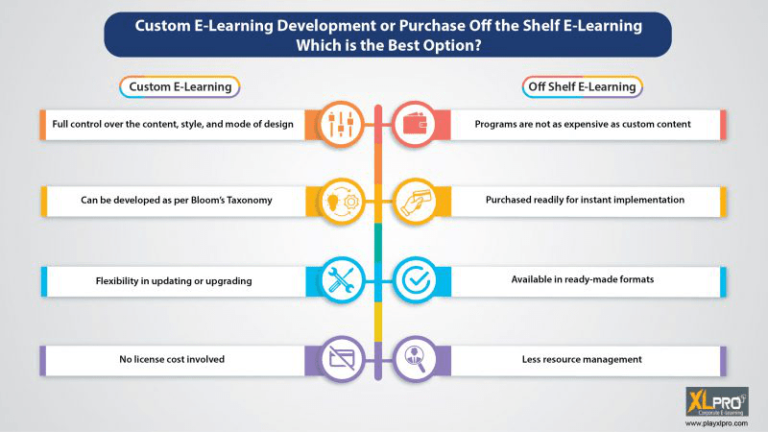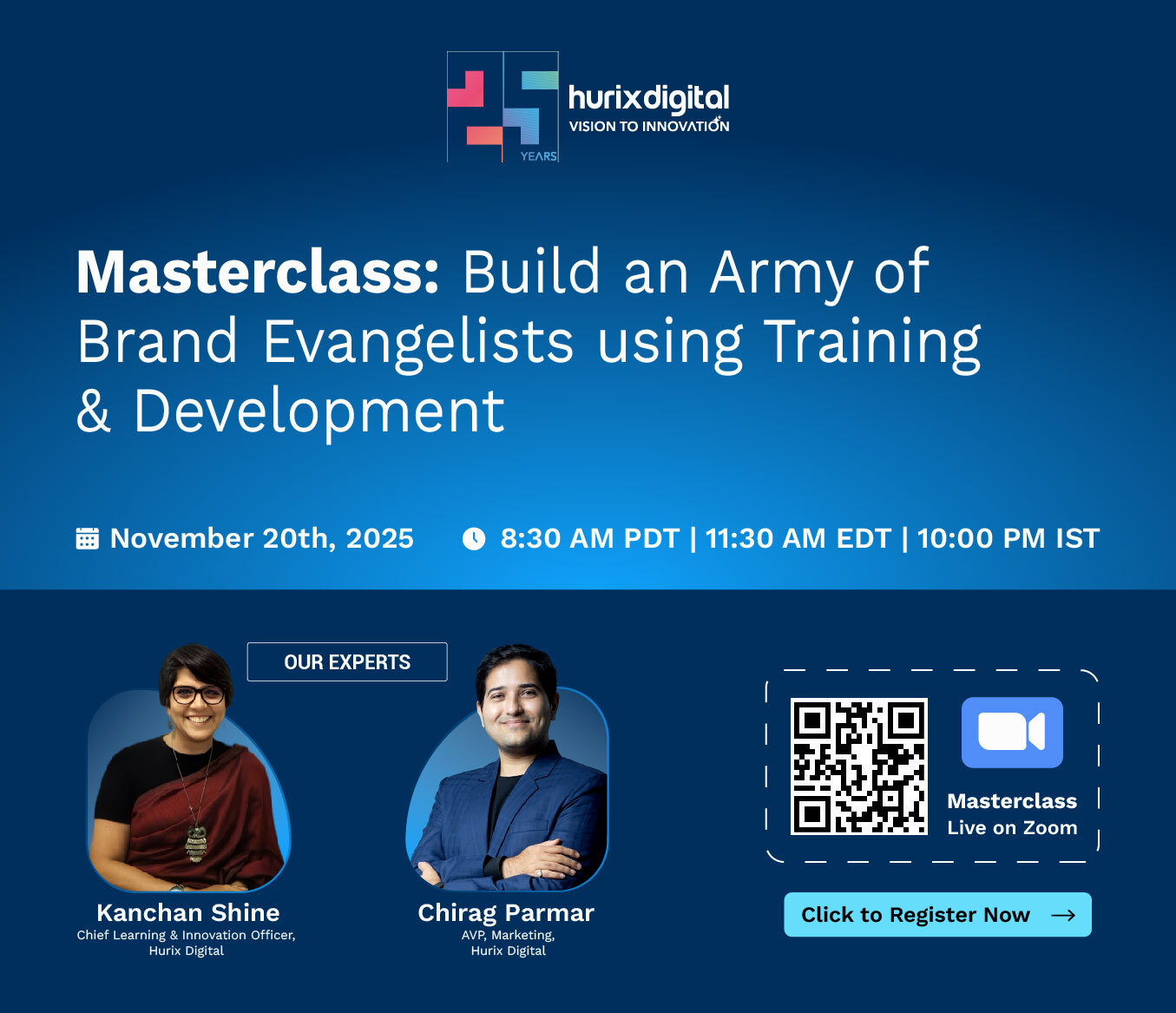
Best Elearning Courses for You: Custom Content or Off-the-shelf Courses
Summarize with:
There has been a paradigm shift in the approach of businesses towards the learning and training of employees. There has been a move from the regular and mundane classroom techniques, to the fresh and modern methods of eLearning which is now used to create a more conducive learning experience with custom elearning content development.
There is often a dilemma that is faced by Learning and Development managers due to the increased demand to roll out learning courses online. The question that they are confronted with is whether to purchase a learning course that is available off-the-shelf or to develop customized learning content that is specific to their needs.
Custom content development and off-the-shelf training can each fulfil certain business needs due to their own set of advantages. However, it is important to determine which solution would work best for your training needs and which would integrate well with your business.
The difference between customized e-learning content development and off the shelf courses
| Basis of Distinction | Customized Courses | Off-the-shelf Courses |
| Nature of content | For specific content. | For generic content. |
| Business Needs | Can be customized to meet the needs or requirements completely. | May not meet business needs as the content is created in advance and is generic. |
| Cost | Expensive to create customized courses with particular requirements. | Front-cost is relatively low as they are ready-made. |
| When appropriate | When customizations are necessary, usually for training large groups. | When training is more universal in nature. |
| Time | It is a time-consuming process | Time and cost effective as it only has to be installed which is a quick process. |
Off-the-shelf elearning Courses:
An off-the-shelf course refers to an official course outline which is delivered as if it was originally prescribed to be taught by a certain trainer. It is affordable as it is readily available and is pre-loaded with a plethora of features. These courses do lack flexibility as they can’t be tailor made to suit the needs of a business, which therein makes it difficult to integrate the course with other technologies.
When can off-the-shelf courses be used?
Off-the-shelf courses is often most suitable for training where the content is universal. Individuals preparing for an exam or certification which requires more generic information or content would benefit better from off-the-shelf courses.
Universal content – When the content is universal in nature and is more generic in comparison to specific training programs or software, off the shelf training would work best. Courses can be rolled out on more general topics such as negotiation, team building, compliance training, and the like which cover all relevant topics and is informative instead of spending excess money and time on customizing the content.
Urgency in requirement – When the requirement is immediate and is urgent, off-the-shelf courses work well as they are readily available for upload on a Learning Management System.
Affordability – Off-the-shelf courses are an affordable option as they are ready made and don’t require investment of any additional resources. Costs involved are relatively low as the development cost is distributed among many users.
Customized Courses
Custom content development or customized courses provide an opportunity to modify, add, remove, or alter any content to a particular course outline to suit it best to the needs of a business.
When can customized courses be used?
Custom content would be the best choice when a business rolls out new versions of a software and wants its employees to get well versed with the latest features.
Distinct training requirements – Custom content development is apt when there is a requirement for specific training needs. Not only is there a good amount of control over the content you want, there is also increased workflow and reduced wastage of time and money.
Dynamic training content – Training needs can change over a period of time. Custom content development is apt for such cases as you own the customized course and can make changes easily at no additional costs. Here’s more on how to optimize your eLearning ROI.
A reflection of your brand – Through custom courses, you can express the story you wish to with specific concept illustrations, colors, and by using a company logo to make your content more specific to your organization, which also promotes your brand.
Pros and Cons – Custom course and off-the-shelf training

Off-the-shelf training courses
Pros
Lower up-front cost – The cost of setting up off-the-shelf courses is relatively low. The front cost tends to be inexpensive as all that is required is purchase of the course training materials online and it’s installation. The process is simple and highly cost-effective.
Rich features – Off-the shelf courses have multiple features that are already available in the learning material.
Meet business needs – The content is created and developed in an easy-to-learn format by leading industry experts that could benefit your employees and your business.
Support – Support is included in off-the-shelf courses or can even be added with a maintenance contract. Communities of users across different forums online provide self-help support as well.
Quick to deploy – Off-the-shelf courses are easy and quick to deploy.
Vendor managed – The design, development and testing is handled by the vendor.
Cons
While it provides a host of advantages, off-the-shelf training has several disadvantages which makes customization more favorable.
No tailor-made course content – Off-the-shelf courses are generic. While they cover an array of different topics which could help your business, it may not be specific to your needs.
Potentially irrelevant topics – Since it is more generic in nature, certain topics which are not relevant may be included, which could be a waste of time.
Unnecessary features – There may be several irrelevant features which actually complicate what would have been simpler to manage. Requests for certain features would likely go unheard and future enhancements may not even be relevant to your business.
Poor retention – Since the content is not specific to your particular business, the retention may be poor.
Upgradation costs – While the initial purchase cost is only one of the price considerations for off-the-shelf software, due to upgradations, software support, or monthly or annual licensing fees, the cost can exceed the costs of a customized solution.
Not in conformity with business guidelines – Off-the-shelf courses may include certain technical or security solutions that do not conform to your internal business guidelines.
Custom eLearning Content Development:
Pros
You are in full control – In customized content development, you have complete control over the content, design, style, development and deployment of the e-learning course. It allows you to design functionalities in a meaningful way that are specific to your business requirements.
Bloom’s Taxonomy – Customized e-Learning content can be developed as per Bloom’s Taxonomy which allows for specific learning objectives to be achieved.
Flexibility – There is flexibility in customized courses with regard to updating or upgrading the course content as well as to create or remove features and functionalities.
Availability of templates – You can choose from the various templates available, or get a customized template designed by the vendor. Here are 11 smart tips to choose the right eLearning vendor.
Better workflow – A custom course yields higher productivity as there is better workflow due to data being available all in one place.
Cons
Expensive – Custom-made content is generally much more expensive than off-the-shelf courses. The added value of customization may not even be enough to warrant the higher cost of the course.
Additional resources – The internal processes and procedures followed in the course of business needs to be closely monitored by a development team to come up with a proper course outline.
Time consuming – Developing custom content could take a great deal of time before it is completed and ready for deployment. It could take anywhere from two weeks to months.

Conclusion
Off-the-shelf training and customized training have their own set of pros and cons. While off-the-shelf is relatively quick and easy to obtain and implement, it isn’t always effective to fulfill specific needs of your business and employees. Custom content is all about customizing a course to your requirements. It is all about what you need for your business. Even though it is time consuming, it ensures efficiency and results, and guarantees a productive learning experience.
 Upcoming Masterclass | Build an Army of Brand Evangelists using Training & Development | November 20th, 8:30 AM PDT | 11:30 AM EDT | 10:00 PM IST
Upcoming Masterclass | Build an Army of Brand Evangelists using Training & Development | November 20th, 8:30 AM PDT | 11:30 AM EDT | 10:00 PM IST




